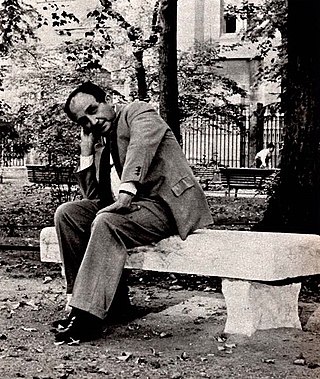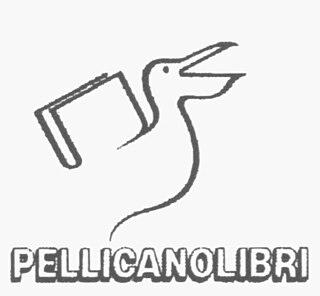
Umberto Piersanti (born February 26, 1941) is an Italian poet, prose writer, professor of sociology of literature at the University of Urbino, in Italy, and editor of the literary revue Pelagos.

Umberto Piersanti (born February 26, 1941) is an Italian poet, prose writer, professor of sociology of literature at the University of Urbino, in Italy, and editor of the literary revue Pelagos.
He was born in Urbino. During his writing career Piersanti published many poetry books and some novels and essays.
He made his debut in 1967 with the collection of poems La breve stagione; the melancholy preponderated in his juvenile poems, with Apennine nature, transformed into a mythical and classic place.
In Nascere nel '40 (1981) e Passaggio di sequenza (1986), Piersanti examined the historical and politic contest between 1960-1980.
He was a nominee for the Nobel Prize for Literature in 2005.

Piero Camporesi was an Italian historian of literature and an anthropologist. He was a professor of Italian literature at the University of Bologna.

Biagio Marin (1891–1985) was a Venetian poet, best known for his poems in the Venetian language,. In his writings he never obeyed rhetoric or poetics. He only employed a few hundred words for his poems.

The Strega Prize is the most prestigious Italian literary award. It has been awarded annually since 1947 for the best work of prose fiction written in the Italian language by an author of any nationality and first published between 1 May of the previous year and 30 April.
Roberto Carifi, is an Italian poet, philosopher, and translator, supported since the beginning from Piero Bigongiari, one of the major exponents of Florentine Hermeticism. Considered one of the most important poet and intellectual of his generation he has been influenced by having a very difficult illness to cope with.

Roberto Pazzi was an Italian novelist and poet. His works have been translated into twenty-six languages. He was widely recognized in Italian literary circles for his poetry and novels. His Debut novel, Cercando l'Imperatore in 1985, received a number of international awards and started a prolific career of historical and contemporary novels.

The David di Donatello for Best Score is a film award presented annually by the Accademia del Cinema Italiano to recognize outstanding efforts on the part of film music composers who have worked within the Italian film industry during the year preceding the ceremony. The award has been given every year since 1975, with the exception of the 1979 and 1980 editions.

Girolamo Graziani was an Italian poet and diplomat.

Giovanni Raboni was an Italian poet, translator and literary critic.

Fulvio Tomizza was an Italian writer. He was born in Giurizzani di Materada in Istria, to a middle-class family. His mother was Margherita Frank Trento, born into a poor family of Slavic extraction. His father, Ferdinando, reportedly was from an ancient family of southern Dalmatian Italian origins. Tomizza grew up in a zone where the dialect was mixed.

Laura Belli is an Italian actress and singer.

Alfonso Gatto was an Italian writer. Along with Giuseppe Ungaretti he is one of the foremost Italian poets of the 20th century and a major exponent of hermetic poetry.

Paolo Volponi was an Italian writer, poet, and politician.

The Pellicanolibri editions is a publishing house founded in 1976 in Catania by the poet and writer Beppe Costa, with the specific intent to highlight authors and discover forgotten or unknown youth.

Luciano Berio was an Italian composer noted for his experimental work, and for his pioneering work in electronic music. His early work was influenced by Igor Stravinsky and experiments with serial and electronic techniques, while his later works explore indeterminacy and the use of spoken texts as the basic material for composition.

Franco Pappalardo La Rosa is an Italian journalist, literary critic, and writer. He graduated from Turin university. He has lived in Turin since 1963. He contributed to cultural pages of Giornale del Sud, L'Umanità and Gazzetta del Popolo, and to many dictionaries, as Dizionario della Letteratura Italiana, Grande Dizionario Enciclopedico-Appendice 1991 and Dizionario dei Capolavori. Nowadays he contributes to many literary magazines, as Hebenon, Chelsea and L'Indice. He edited the publication of some works written by contemporary Italian writers, as Stefano Jacomuzzi, Giorgio Bàrberi Squarotti, Emanuele Occelli, Francesco Granatiero and Angelo Jacomuzzi. He took part in National and International Conferences on figures and aspects of contemporary poetry and fiction. He edits I Colibrì, fiction library between journalism and literature. He is founding member and member of the Board of Governors of the International Association “Amici di Cesare Pavese”.
Andrea Aromatico is an Italian writer and expert in Hermetic iconography and esotericism.
Giampietro Pontiggia, pen name Giampiero Neri, was an Italian poet. He was noted for his novel style; his work is known for its concise, dry, and unembellished style, and veined with melancholy and humor. His work was often written in prose.